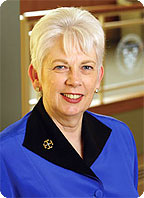
Presidential Perspectives:
The Value of a Liberal Arts Education
 The verdict is in—employers believe that a liberal education provides the best possible training for the college graduates of today and tomorrow. Saint Mary’s President Carol Ann Mooney comments on a new report, College Learning for the New Global Century , published by the American Association of Colleges and Universities.
The verdict is in—employers believe that a liberal education provides the best possible training for the college graduates of today and tomorrow. Saint Mary’s President Carol Ann Mooney comments on a new report, College Learning for the New Global Century , published by the American Association of Colleges and Universities.
What’s your reaction to the study’s main finding—that today’s college graduates need a broader knowledge and skill set than the ones that might get them their first job?
I love the report. I think it’s exceptionally well done. It helps people to focus on the goals of a liberal education and to understand that the current emphasis on preparation for one’s very first job is inadequate. In fact, the essential learning outcomes for our time must be much broader. Education must be about preparing citizens for tomorrow, not just preparing employees for tomorrow.
What specific skills are today’s business leaders looking for?
For this study, researchers interviewed 305 executives at companies with at least 25 employees, where at least 25 percent of new hires hold a bachelor’s degree or higher. They asked what qualities employers were looking for in new hires. Surprisingly, they found that employers do not want to know if you’re ready to hop into your first job armed with all the specific technical training needed to do that job. The most important skills they look for are #1, teamwork; #2, critical thinking and reasoning; and #3, oral and written communication.
The report also cites four “essential learning outcomes” that individuals need to be successful in today’s global economy, and which business leaders overwhelmingly endorse. These are knowledge of human cultures and the physical and natural worlds, intellectual and practical skills, personal and social responsibility, and “integrative learning”—the ability to apply knowledge in real-world settings. All of these, of course, are outcomes that a liberal education strives to provide.
How do the goals for student learning at Saint Mary’s fit with these findings?
The goals fit very well, but they do not go quite far enough. At Saint Mary’s College, our goal is not simply to create an educated citizenry, not simply to develop socially responsible graduates because it’s good for society. Our goals have to do with our Catholic and religious identity, and with forming people whose sense of obligation to the commonweal comes from a sense of obligation to God’s creation.
One of the things the report cites is the need to give students an opportunity to think about the “big questions” of today as well as the perennial big questions, such as, what does it mean to live a good life? At Saint Mary’s, the big questions have additional dimensions. One reason our nursing and business graduates are successful and sought-after is that they have not just professional training but a type of personal training that gives them a sense of how what they do fits within the greater society, and where it fits within their own life goals.
A liberal education sounds great, but isn’t it a luxury? Can our society afford to provide its citizens with this kind of preparation?
Our society can’t afford not to. I truly think that our major economic development strategy, as a country, is higher education. I don’t see that we have any other. Just having people with the skills to do a specific job will not give us the creativity, the critical questioning, or the ability to think about bigger, broader issues that are needed to solve the problems we must solve.
I think the consumer mentality has brought us to a point of thinking that the benefit of education is like a consumer benefit, and therefore individual. That’s partly true and that’s part of why people are willing to pay for education. But in the end, it’s not what really excites our students at Saint Mary’s.
What gets them jazzed is the opportunity they have to think in ways that help them sort out who they are, what their goals are, how that all fits together, and how it fits with society’s problems. Talk to our young women. What do they want to do? They want to make the world better. A liberal education helps them to think about that and act on it, with greater skills and sophistication than when they first arrived here.
Go to aacu.org for more information about College Learning for the New Global Century.
